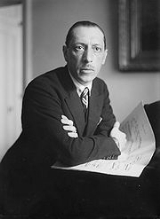
Igor Stravinsky
Topics
Igor Stravinsky
Quotations

Quotations
Igor Fyodorovitch Stravinsky (Russian: Игорь Фёдорович Стравинский) (June 17, 1882 – April 6, 1971), a Russian-born composer, is thought to be one of the most influential composers of the 20th century. His musical language evolved over the years through many stylistic periods including Neoclassicism and Serialism, though he is perhaps most remembered for his early works, written in a primitive style for Sergei Diaghilev's Ballets Russes; L'Oiseau de Feu (The Firebird), Petrushka and Le Sacre du Printemps (The Rite of Spring).
Sourced
- "The phenomenon of music is given to us with the sole purpose of establishing an order in things, including, and particularly, the co-ordination between man [sic] and time."
- Quoted in DeLone et. al. (Eds.) (1975). Aspects of Twentieth-Century Music. Englewood Cliffs, New Jersey: Prentice-Hall. ISBN 0130493465, Ch. 3. from Igor Stravinsky' Autobiography (1962). New York: W.W. Norton & Co., Inc., p. 54.
- Music's exclusive function is to structure the flow of time and keep order in it.
- Quoted by Géza Szamosi, The Twin Dimensions: Inventing Time and Space (New York, 1986), p. 232
- "One has a nose. The nose scents and it chooses. An artist is simply a kind of pig snouting truffles."
- 1962, quoted in Andriessen and Schoenberger, The Apollonian Clockwork (1989). Oxford: Oxford University Press.
- "For I consider that music is, by its very nature, essentially powerless to express anything at all, whether a feeling, an attitude of mind, a psychological mood, a phenomenon of nature, etc....Expression has never been an inherent property of music. That is by no means the purpose of its existence. If, as is nearly always the case, music appears to express something, this is only an illusion and not a reality. It is simply an additional attribute which, by tacit and inveterate agreement, we have lent it, thrust upon it, as a label, a convention - in short, an aspect unconsciously or by force of habit, we have come to confuse with its essential being."
- Igor Stravinsky (1936). An Autobiography, p.53-54.
- "My music is best understood by children and animals."
- Igor Stravinsky. The Observer, Oct 8, 1961
- "The over-publicized bit about expression (or non-expression) was simply a way of saying that music is supra-personal and super-real and as such beyond verbal meanings and verbal descriptions. It was aimed against the notion that a piece of music is in reality a transcendental idea "expressed in terms of" music, with the reductio ad absurdum implication that exact sets of correlatives must exist between a composer's feelings and his notation. It was offhand and annoyingly incomplete, but even the stupider critics could have seen that it did not deny musical expressivity, but only the validity of a type of verbal statement about musical expressivity. I stand by the remark, incidentally, though today I would put it the other way around: music expresses itself."
- Igor Stravinsky and Robert Craft (1962). Expositions and Developments.
- "It is the transcendent (or 'abstract' or 'self-contained') nature of music that the new so called concretism--Pop Art, eighteen-hour slices-of-reality films, musique concrete--opposes. But instead of bringing art and reality closer together, the new movement merely thins out the distinction."
- Igor Stravinsky and Robert Craft (1982). Themes and Conclusions, p.188. Berkley: University of California Press.
- "What I cannot follow are the manic-depressive fluctuations from total control to no control, from the serialization of all elements to chance."
- Igor Stravinsky and Robert Craft (1982). Themes and Conclusions, p.33. Berkley: University of California Press.
- "Much of the music is a Merzbild, put together from whatever came to hand. I mean, for example...the Alberti-bass horn solo accompanying the Messenger. I also mean the fusion of such widely divergent types of music as the Folies Bergeres tune at No. 40 ('The girls enter, kicking') and the Wagnerian 7th-chords at Nos. 58 and 74."
- Igor Stravinsky and Robert Craft (1982). Dialogues, p.27.
- "Composers combine notes, that's all."
- Igor Stravinsky and Robert Craft (1982). Dialogues, p.52.
- "The trouble with music appreciation in general is that people are taught to have too much respect for music; they should be taught to love it instead."
- Igor Stravinsky. "Subject: Music", New York Times Magazine, 9/27/64
Unsourced
- "Doomed to total failure in a deaf world of ignorance and indifference, he inexorably kept on cutting out his diamonds, his dazzling diamonds, of whose mines he had a perfect knowledge."
- Regarding Anton Webern
- "Afterwards, after the concert, I heard them say: 'Too much noise'. And I wanted to ask: 'Where, exactly?'"
- Regarding a comment made of one of his concerts
- "Silence will save me from being wrong (and foolish), but it will also deprive me of the possibility of being right."
- "Harpists spend 90% of their time tuning their harps and 10% playing out of tune."
- "Music must be listened to; it is not enough to hear it. A duck hears also."
- My childhood was a period of waiting for the moment when I could send everyone and everything connected with it to hell.
- "Good composers don't borrow, they steal"
- Compare:
- Immature poets imitate; mature poets steal.
- T. S. Eliot, in Philip Massinger, in The Sacred Wood (1920)
- Immature poets imitate; mature poets steal.
Silverdale Interactive © 2026. All Rights Reserved.

